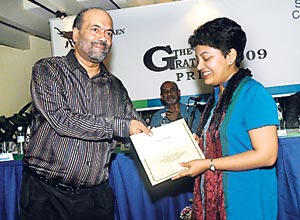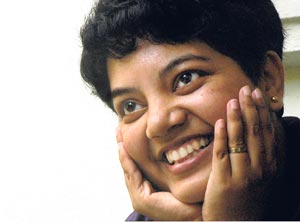Prashani Rambukwella is a preacher’s daughter who found herself fascinated by demons. Yakas and bahirawayas populate her Gratiaen Prize winning debut, a novel for children titled ‘Mythil’s Secret’. But the book is very different from anything Prashani herself read as a child.
The adults in the novel struggle with unemployment and marital strife, they’re loving, and irrational and all too human. Feeling helpless and more than a little afraid, one little boy embarks on an adventure that is about understanding – himself, his family, his friends and a gift that might pit him against a supernatural world he is barely beginning to fathom.
The 166 page novel began as a 36 page draft eight years ago. Over the course of getting married, having a child, changing cities and holding down different jobs, Prashani slowly expanded and polished her little story, turning it into the accomplished piece it is today. “I did dream about being a published author, but I never thought it would happen,” she says, smiling happily.
In person, Prashani has something of a child about her – small made, unaffected and vivacious; she keeps her hair short and her smiles wide. When she walked up to receive the 2009 Gratiaen, she was clearly amazed, never having expected to win. Today, she repeats the sentiments she expressed in her acceptance speech when she describes the writing of the novel as a community project. Through multiple drafts, friends, family and publishers asked her the tough questions. “It may be a children’s book but you really need to take it seriously and I think we did do that,” she says.
Prashani herself has been serious about writing for as long as she can remember. Having graduated with a degree in English Literature from Peradeniya University, she has always written for a living. For most part it’s been of a more pedestrian bent – as a feature writer on the now defunct newspaper ‘The Weekend Express’ and later for the communications division of a bank where she drafted press releases and internal mails. On the side, however, she’s always been an author of fiction and has written many stories – enough to fill several notebooks. But Mythil’s story is the first she was confident enough to show anyone. It was also the first to feature yakas.
Her first attempts at writing stories were informed by those she knew best. Series like the Famous Five by Enid Blyton were assiduously collected and read, and Prashani even directed friends in playground remakes of the T.V series. “If I really take to a book, I need to re-imagine myself into the story,” she says. Not one to take the main role, she gravitates toward the bit parts. Still, a steady diet of Western literature didn’t lend itself to her habit. “They were quite simply set in a different world, it wasn’t the world I lived in,” she says. “That’s when I really decided that I wanted to see books set in Sri Lanka for Sri Lankan kids.”
As a result, Mythil is a Sri Lankan down to his love for good kevili – but Prashani manages to make both her characters and their environment uncontrived. Mythil longs for the latest video games, and his family is considering immigrating to Hong Kong, but when he finds himself in his beloved Archchi’s home, it’s a world of sprawling old mansions bordered by streams, paddy fields and dark jungle.
It’s a scene that Prashani recreated from her own memories of her grandmother’s house in Kalutara. “My grandmother used to live in this ramshackle house and she had this enormous garden, with lots and lots of trees,” she says, confessing, “this house is sort of based on that.” When Prashani’s grandmother passed away a year before she began writing ‘Mythil’s Secret,’ Prashani knew Archchi would find her way into her novel. “She was the person I loved most of all in the whole world, just like Mythil does his Archchi. I knew there would be a grandmother in the story because I had just lost mine. It was a sort of tribute to her.”
The mythological aspects of the novel are the creation of many voices and many authors. “Just when I’m ready to say, ‘it’s all my imagination,’ I think ‘oops, this sounds a bit like that other story,’” says Prashani. While researching the novel, she drew from Sri Lanka’s rich oral history and also read extensively. However, “the more I read the more I realised I would never be an authority on the subject. It’s a living thing,” she says, explaining she discovered the story changed with the teller, the time and the place.
“There was no point in my trying to be really authentic with the yaka stuff, I decided to just have fun with it,” she says, adding that she decided to just imagine what yakas would be like if they were around and had evolved alongside mankind. In creating the character of Mythil, Prashani drew on many hours spent with children, some in her capacity as a Sunday School teacher. Prashani began teaching in Sunday School when she was 16, the year her father quit his job at the American Embassy to become a preacher. Describing her childhood as sheltered, Prashani says she welcomed what she saw as a grand adventure. It’s an attitude she shares with Mythil. But Mythil’s adventurous side is triggered when he runs away to give his quarrelling parents something else to think about, a situation that Prashani handles with great skill and sensitivity.
 |
| Taken by surprise: Prashani reacts on hearing that she’s won the 2009 Gratiaen award at the ceremony on Saturday, May 8. The Standard Chartered Bank sponsored the Gratiaen Prize this year as it has done in the past several years, the award ceremony being hosted at the Bank CEO's residence. |
Arguing that children should be respected as persons in their own right, rather than treated as tiny “sub-adults” Prashani decided to bequeath a less than perfect life to Mythil. He experiences helplessness and confusion as he tries to understand why his parents suddenly seem to hate each other so intensely. “No one takes you seriously as a child or they try to shield you and you are left to imagine things which are sometimes a lot worse than reality because when you’re a child, your imagination is something else, it’s this ungovernable beast,” says Prashani, adding firmly, “it’s important to be straight with kids, important to take them seriously.”
Providing the perfect foil to Mythil’s tempestuous personality is the little girl Ianthi. Unlike Mythil, Ianthi strives to behave like an adult. She wants to be a psychologist when she grows up and so when she first approaches Mythil she considers him not only a prospective friend but her first client. As you can imagine, Mythil doesn’t take kindly to this. He’s not very pleased to find himself tangled with the Asiri the yaka either, but when hostile forces threaten them all, Mythil discovers a backbone of steel and the importance of friendship.
Since Prashani despises tales that conclude with pithy morals, she folds her message into much mayhem and hilarity. For the adult reader though, the movement toward understanding the other, the transition from fear and distrust to warm acceptance, give the book depth and complexity. Which is why, we are heartened to discover she already has at least another two books in mind.
The second might even find Mythil in Hong Kong, battling the Chinese equivalent of makaras or dragons. “It might take another eight years for the sequel, though,” says Prashani, grinning unrepentantly. As a mother to a very tiny Sananya Heili, she says she and her husband Harshana haven’t had a full night’s rest in nine months.
She expects to have her hands full with her little girl and her work for a while to come. Writing, as before, must be consigned to weekends, late nights and holidays. But now that Prashani’s fans have discovered her, they know she will be worth the wait. |



